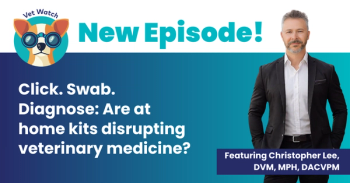
Veterinary Medicine Essentials: Canine and feline lymphoma
Each Veterinary Medicine Essentials package covers diagnostic steps, treatment plan guidance and the latest updates, plus resources to share with your entire veterinary team and your clients.
Cancer. Everyone hates this diagnosis. And lymphoma is one of the most common malignancies you'll encounter in veterinary practice. Here are our best articles on identifying this lymphatic system menace and choosing the right treatment options.
Updates on lymphoma
Canine lymphoma update
Sep 13, 2016
You may have heard it's coming, and now it's here: monoclonal antibody therapy to assist in the treatment of lymphoma in your canine veterinary patients. ...
Monoclonal antibody therapy for canine lymphoma: Promoting the fight from within
Oct 05, 2015
Success in people has led to the investigation of using this therapeutic technology in veterinary practice to help dogs. ...
Debilitating diseases beware: New technologies on the way to stop you in your tracks
Sep 15, 2015
A variety of new products are in development to halt the morbidity and mortality associated with cancer, arthritis and much more. ...
See Something, Do Something: Why wait? Aspirate!
Jun 08, 2015
A veterinary oncologist's inspiration for a campaign to detect cancer earlier and save more lives. ...
UC-Davis veterinarians uncover key protein for diagnosing, treating lymphoma
Sep 01, 2011
Davis, Calif. - A protein recently identified by veterinary researchers at the University of California-Davis may be key to diagnosing and treating lymphoma in animals and humans. ...
Diagnosing lymphoma
Early detection of cancer requires persistent checks
The eyes are often a site of primary or metastatic neoplasia. ...
Key gastrointestinal surgeries: Intestinal biopsy
You may be hesitant to perform a full-thickness incisional biopsy to obtain an intestinal tissue sample, but in many cases, this technique is preferred. In this article, we review when incisional biopsy is best and provide a simple step-by-step guide to the procedure to increase your confidence. ...
Going deeper: Fine needle aspiration cytology of internal organs (Proceedings)
Fine needle aspiration (FNA) cytology is an excellent adjunctive tool for evaluating internal organs. ...
Skills Laboratory: How to make a high-quality slide from a fine-needle aspirate
Follow this step-by-step guide to prepare a high-quality slide, increasing the value of its interpretation. ...
Practical Matters: Completely stage dogs with lymphoma to select therapy and help determine the prognosis
Selecting appropriate chemotherapy protocols and successfully treating dogs with lymphoma require complete clinical staging of the disease. ...
Treating lymphoma
Just Ask the Expert: How do you treat cats with intestinal lymphoma?
Treatment of feline intestinal lymphoma requires instituting systemic chemotherapy, with or without surgical resection of focal intestinal lesions. ...
Treating lymphoma in dogs and cats
Lymphoma is the most common hematopoietic neoplasm affecting both dogs and cats and results from the malignant transformation of lymphocytes. ...
Advances in lymphoma diagnostics and therapy (Proceedings)
The last few years have brought some interesting and novel discoveries with regard to the diagnosis and therapy of lymphoma in pets. ...
Tips for managing cancer patients in general practice, and when to refer (Proceedings)
Dogs and cats with cancer are typically presented by their owners either because of the physical presence of the mass if it is visible or palpable, or because of the effect of the cancer on the body and its functions. ...
What's next? Rescue protocols for canine lymphoma
Employing different alkylating agents is seen in the design of rescue protocols for lymphoma dogs. oneeded ...
Associated conditions
Don't be fooled by look-alike skin diseases
All of us, at one time or another, were probably guilty of treating one of our sarcoptic mange patients as an allergic patient. It is the perfect example of a patient with the same clinical appearance and symptoms of two diseases: atopy vs. sarcoptic mange. ...
Aftershocks of cancer treatment: Managing side effects (Proceedings)
The majority of cytotoxic chemotherapy protocols in common veterinary use are designed to have a low risk of adverse effects. ...
Treating paraneoplastic hypercalcemia in dogs and cats
About 45% to 65% of hypercalcemic dogs and 10% to 30% of hypercalcemic cats have underlying neoplasia. ...
Veterinary hospice care guidelines (Proceedings)
Many of the hospice and palliative care principles that have been successfully adopted in human hospice for decades are now being embraced to provide end of life care for terminal pets and their families by veterinary professionals. Steve Miles, M.D. said, "Death is not a medical event. ...
Client communication
Client handout: FAQ about chemotherapy in pets
Provide this handout to prepare veterinary clients for what they may face when their pets receive cancer treatment. ...
Client handout: Helping a pet through chemo at home
Guide veterinary clients through the chemotherapy process using this helpful tool. ...
Client handout: FAQ about metronomic chemotherapy
Pass on this handout to help answer veterinary client questions about this form of cancer treatment. ...
New dog cancer website resource
Site shares success stories and tips for dog owners. ...
Quality of life scale
Help clients considering euthanasia. ...
Have You Heard? How owners perceive their pets' responses to chemotherapy (4:18)
Clinicians in Liverpool studied owners' perceptions of their cats' quality of life during chemotherapy for lymphoma. ...
Arming your team
Delivering a cancer diagnosis: Check perception first
If you don't take the time to learn your clients' perceptions about cancer, you're skipping a step. In this audio clip from a recent CVC session, veterinary cancer specialist Sue Ettinger explains how to give your clients an opportunity to share what they know, what they expect and what they want. ...
Before the end: Prepare highly attached clients to face their pets' death
Planning for the inevitable can alleviate the complications of uncertainty and grief, allow clients to better assess quality of life, grieve in a way that honors the human-animal bond and provide you with the privilege to guide clients through what can be one of the most difficult decisions of their lives. ...
The burden of care: A dvm360 Leadership Challenge
Confronting some of the veterinary profession's deepest issues: depression, compassion fatigue, burnout and a high suicide risk. ...
Dig deep to help pets with cancer at your veterinary practice
Use these seven tips to offer support for pet owners when they face the pressure of a beloved pet's cancer diagnosis. ...
The long walk to goodbye
Whether I'm helping pets heal or helping their owners say goodbye, my job in veterinary oncology brings special patients and their families into my life who remind me why I love pets-and my work. ...
Newsletter
From exam room tips to practice management insights, get trusted veterinary news delivered straight to your inbox—subscribe to dvm360.






